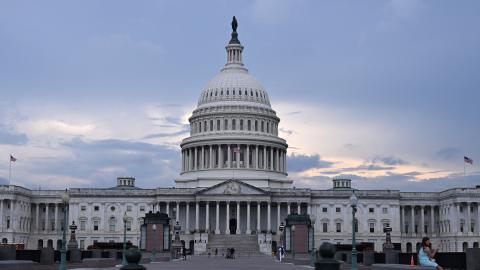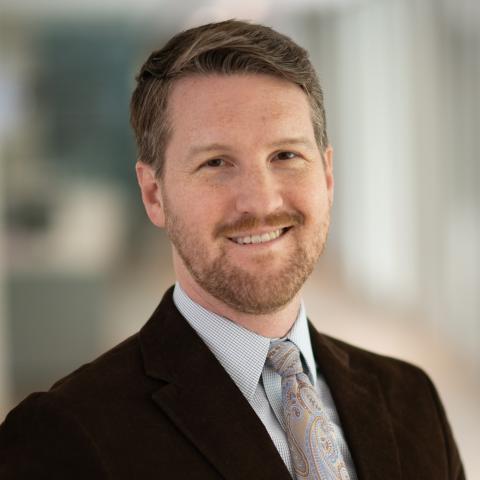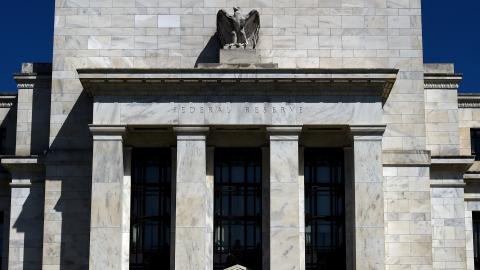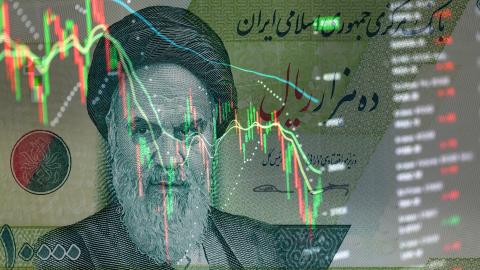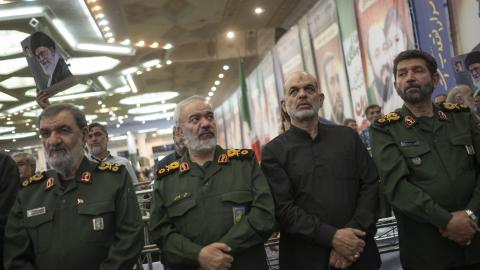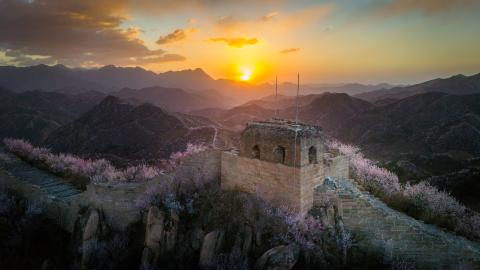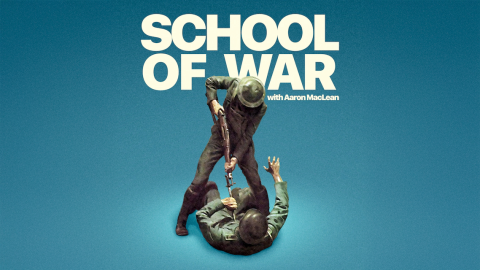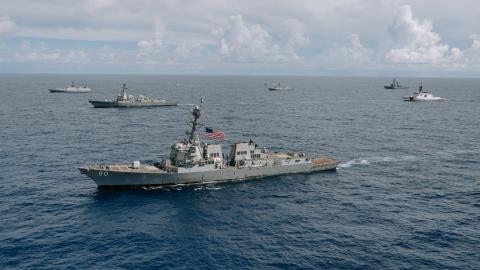
Gaza: Aid, Influence, and Information War
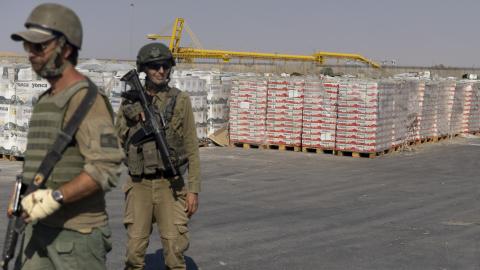

Executive Chairman, Gaza Humanitarian Foundation

Senior Fellow and Director, Center for Peace and Security in the Middle East
Michael Doran is a senior fellow and director of the Center for Peace and Security in the Middle East at Hudson Institute. He specializes in Middle East security issues.
Join Hudson Institute Senior Fellow and Director for the Center for Peace and Security in the Middle East Michael Doran for a conversation with Reverend Johnnie Moore, president of the Congress of Christian Leaders and founder of the Gaza Humanitarian Foundation. As the conflict in Gaza persists, humanitarian efforts are increasingly entangled with political narratives and media manipulation. Moore will discuss the foundation’s mission, the challenges of operating alongside Hamas and the United Nations, and the role of faith-based initiatives in delivering aid in a contested information space.
Event Transcript
This transcription is automatically generated and edited lightly for accuracy. Please excuse any errors.
Mike Doran:
Hi, I’m Mike Doran. I’m a senior fellow here at the Hudson Institute, and I’m the director of our Middle East Center here. And today I’m joined by Reverend Johnnie Moore. He’s the chair of GHF. Welcome, Johnnie.
Johnnie Moore:
Thanks, Mike.
Mike Doran:
Great to have you here.
Johnnie Moore:
Good to be with you.
Mike Doran:
GHF, as everyone knows, is at the center of the storm right now. I can’t turn on the television or the radio without hearing something about your organization. Why don’t you just start by giving us some boring background to who came up with the idea of distributing food to Gazans in this way, and when did you become involved?
Johnnie Moore:
Well, first of all, Mike, as you know, I think people here know that the economy in Gaza before October 7 was an aid-based economy. So, there has been this perennial multi-decade relationship between the aid community and between Gaza. There have been concerns for many, many years that the way the aid system was operating in Gaza from beginning to end, it was able to be controlled, manipulated, coerced by Hamas to use the aid for unintended purposes. Hamas would, as aid arrived in the Gaza Strip, they would take a certain percentage of the aid and they would warehouse it for their own purposes. They would tax the aid, they would take free aid and they would sell it. So, you’re making 100 percent profit, more than that. To get something for free, you sell it for whatever you want. And so, the system in the Gaza Strip has been broken for a long, long period of time. People have been concerned about that for a long period of time.
But after October 7th, it became even more apparent that not only was the system of aid being manipulated and corrupt, but actually, it was complicit in some of the activities of October 7th. And so, at a certain point over the course of this current war a group of individuals, private sector individuals working in collaboration with policymakers started saying, “If we were to really address the core issue here, what would it look like?”
Mike Doran:
These individuals are Israeli, Americans, or both?
Johnnie Moore:
A combination, a combination of people. And the actual impetus for the idea of GHF was incubated in the Biden administration. Like we’re accustomed to seeing both in the first Trump administration, the second Trump administration, it takes Donald Trump to implement some unconventional ideas. And that’s what GHF is as we know it now. On May 5th in the White House President Trump said that he was angry that the aid intended for the people of Gaza was being stolen by Hamas and the United States was going to do something about it. And this was about a week before he went to the Middle East. And so, GHF became the only mechanism in the Gaza Strip for distributing massive amounts of aid that Hamas cannot, as they like, divert. And divert as of course, these images that we’ve all seen of convoys of a trucks being taken over by armed actors.
But what diversion really is, or the UN’s preferred term is interception. What it really is, it’s stealing. And so, Hamas has stolen the vast majority of aid that has gone into the Gaza Strip. By the UN’s own statistics 90 percent of the World Food Programme trucks in recent months have been intercepted either by regular Gazans taking them over. But most of these people have guns. They’re probably not regular Gazans that are taking the aid. GHF, aside from addressing that problem, has been the major consistent source of aid in the Gaza Strip for the last two months. And tomorrow we will surpass 100 million meals of aid provided for free in the Gaza Strip.
Mike Doran:
Just out of curiosity, is that meals or boxes?
Johnnie Moore:
So, a box, it’s like a food parcel, and it’s like what the United Nations does, except for our boxes have a higher caloric count than the United Nations requirement. It’s a higher quality food, and it includes like multiple things. It’s not just flour. You see, the World Food Programme trucks come and they have a truck of flour and they just drop it in the middle of the Gaza Strip. They call that self-distribution in UN speak, when people just grab the flour. Our boxes include flour and oil, and—
Mike Doran:
I sense some criticism of the UN in your tone.
Johnnie Moore:
I do want to say at the very beginning, we are not designed to operate alone. The plan for the very beginning was to cooperate with the UN, and we had profound disagreements with the UN. I’m certainly happy to share them.
Mike Doran:
I’ll pull all of them out from you.
Johnnie Moore:
Well, they frankly deserve it, because I’ll just give one now. Over the course of our operation, the United Nations itself has in many ways become the saboteurs of many things that we’re trying to do. And actually, they’ve sort of become the press secretaries for a lot of Hamas disinformation that has been laundered through the United Nations, which has been incredibly, incredibly unhelpful to us.
Mike Doran:
I’ll come back to that. I’ll dig into all the details on that. But so, the boxes that you distribute, that they have multiple meals, so you have to . . . How many meals?
Johnnie Moore:
Tomorrow we’ll surpass 100 million.
Mike Doran:
100 million.
Johnnie Moore:
And that’s four of these mass distribution sites and also a community distribution system that’s more akin to the old UN system that we actually take boxes to the most vulnerable, more deeply into the Gaza Strip. But a box is three and a half days of food for a family of five.
Mike Doran:
I get all my information from the New York Times, that’s really basically my only source. And when I read the New York Times, I’m told pretty much explicitly that Hamas is not actually taking and taxing the food the way you’re saying. And they have numerous quotes in the articles from the newspaper record, from people who work for the World Food Programme or for UNRWA and so on, saying that they have never seen a food taken by Hamas.
Johnnie Moore:
Before the UN started lying about this, they actually told the truth. And there are all kinds of public databases where the UN actually self-discloses the fact that their aid is being diverted, their UN reports. By the way, there are also US government reports that have analyzed how UN programs, for instance, one example is at a certain point in Somalia the single largest payment that was taking place in the Somalian economy was going to a series of clans that were providing armed . . . Their job was to get the food to the ultimate . . . WFP was basically outsourcing the job of getting the food to the beneficiaries to these armed clans. In the end, the estimate is that between 12 and 17 percent of the food actually made it.
In every piece of the supply chain you have diversion. In the Biden administration, a decision was made to basically just flood the zone in Ethiopia with food when the Ethiopian/Tigray conflict was taking place. And the Ethiopians, and I’m not an expert in this conflict, so I’m not going to provide commentary on a word I don’t understand, but the Ethiopians were taking the World Food Programme flour, putting it through commercial refineries and feeding their soldiers, while the Tigray soldiers stole multiple tens of thousands of metric tons of flour. So, they were basically fueling both sides of the conflict, aid was just . . . So, this is not an easy problem to solve. I mean, we can’t let people starve, but there has to be a way of doing this where you’re not prolonging wars, feeding conflicts, and that’s what GHF was designed to do.
Mike Doran:
Or playing directly into the hands of Hamas. It doesn’t even have to be diversion. I mean, we know how Gaza works, and Gaza is under the control of Hamas. And something as valuable as this, and it’s incredibly valuable, both in terms of feeding your own men, taking care of the people that are good to you, making money, taxing it, and so on.
Johnnie Moore:
It’s not an insignificant amount of money either. You’re talking about the only source of revenue for Hamas over the course of this war, multiple hundreds of millions of dollars just by manipulating the humanitarian aid system. And I want to say, our purpose is just to feed people, but the fact that Hamas made the number two negotiating demand and the ceasefire are being shut down is indicative of the way, by flooding the zone with additional food we certainly broke up the monopoly.
Mike Doran:
What you’re saying though is that there really is a de facto alliance, at least an alliance or an alignment of interest between the United Nations and Hamas. We already know that with UNRWA and Hamas, but this is what you’re saying pretty much explicitly now. And so, I want to know how do you see it? Do you see it alignment of interest or alliance?
Johnnie Moore:
It’s both. It’s both. And sometimes it’s both at the same time and sometimes it isn’t. For instance, the United Nations is trying to save UNRWA.
Mike Doran:
Actually, for people out there, there may be people watching who don’t know what UNRWA is, let’s—
Johnnie Moore:
Yeah, so UNRWA is the only refugee agency in the world that exists for one people, and it’s for the Palestinians. UNRWA has a budget that’s comparable to the UN budget for all other refugees and any other conflict around the world. So, UNRWA became the backbone of the Palestinian economy across the board. But in Gaza, and here’s what that means. There’s one estimate that up to 50 percent, 40 something percent of UNRWA employees were either Hamas or directly connected by a father, they worked for Hamas, or they worked for UNRWA, but their father was Hamas. UNRWA employees were holding hostages. UNRWA facilities had servers for Hamas intelligence-linked computers. UNRWA was—
Mike Doran:
UNRWA schools had weapons in them.
Johnnie Moore:
Exactly. UNRWA became totally infiltrated by Hamas. And of course, the humanitarian principles of humanity and neutrality and independence and impartiality means that if you properly apply them, UNRWA was violating all of them, and violating all of them on scale. And yet, UNRWA had the monopoly on the humanitarian situation. They were not the only operator, but they were the infrastructure. So, when you read about text messages were sent to Gazans to come pick up their food parcels, well, the text messages are sent by UNRWA. So, the food may have come from UNRWA, it may have come from UNICEF, WFP or other supplies, but it became the infrastructure of this aid-based economy in the Gaza Strip, totally infiltrated by Hamas.
Now, the Israelis, they’re done with UNRWA for all of these reasons. And this current administration, like when they were in power the first time, and President Trump was in power the first time, has defunded UNRWA for all of these reasons. But actually, this administration has taken it one step further, because there are multiple Americans that were killed or injured in October 7th, and there were multiple lawsuits working their way through the courts in the United States against UNRWA. But the assumption was that those lawsuits would fail because—
Mike Doran:
UNRWA has immunity.
Johnnie Moore:
. . . UNRWA has immunity. But actually, the Department of Justice in this administration has said that their official opinion, it was released in April, is that UNRWA does not enjoy international organizational immunity. So, the policy of the United States, if Israel matters in this conflict, and if the United States matters in this conflict, UNRWA is just dead on arrival. But what the United Nations is doing is they’re holding the hungry people of Gaza in effect hostage in order to save UNRWA. And they don’t have to do that. They could do more with the World Food Programme, they could do more with UNICEF, they could do more directly with the United States of America. But the political leadership of the United Nations is like going all in on UNRWA.
And to the point you said a while ago in the recent ceasefire negotiations, whether it was implicit or not, whether it was an alliance or a shared interest, the United Nations was basically sitting on the Hamas side of the negotiating table, simultaneously talking about hunger in Gaza, which is real. We have acute food insecurity in Gaza. There is some starvation in Gaza. There is not a famine in Gaza. And yet, while the UN was saying all of these things, they had nearly 1,000 trucks of food inside the Gaza Strip already ready to distribute. But they were not even trying to distribute the food, because they wouldn’t cooperate with the Israelis in order to make sure the food is basically secure.
Mike Doran:
Because of you. Because of—
Johnnie Moore:
Which is so stupid. I’m sorry to say the word stupid in the Hudson Institute.
Mike Doran:
Yeah, that’s really crude, it’s horrible.
Johnnie Moore:
I’m an evangelical.
Mike Doran:
That’s your threshold stupid?
Johnnie Moore:
My threshold has grown in recently.
Mike Doran:
But wait, wait, wait, wait, because I said that like a statement, but that was a question.
Johnnie Moore:
Yeah.
Mike Doran:
They’re withholding that because of GHF?
Johnnie Moore:
The UN, so we keep saying, “We want to partner with UN. We disagree with you. We think the whole system’s broken. We got to reform the system.” Well, we don’t have time to reform the system now, we got to help people. And we even say to them, we’ve said to them 1,000 times, “We’ll adjust our operations. So, if the things you don’t like about what we’re doing, just tell us. And if we can do it, we’ll do it. We are not the fundamental evangelical.” I know what fundamentalism looks like. The UN is behaving like fundamentalist, and GHF is over here saying, “We’re willing to adjust.” But the UN is in effect running, has run from the beginning a boycott of GHF. But it’s more than a boycott of GHF, they’ve actually told organizations that if they work with us, they’ll never work with the UN again, the United States Ambassador.
Mike Doran:
If you’re running any kind of humanitarian organization, having the UN tell you that it won’t work with you means that it’s—
Johnnie Moore:
Oh, you’re over.
Mike Doran:
You’re finished. You’re finished.
Johnnie Moore:
There’s a very, very prominent part of our very short history, that the backstory of that very prominent part of our very short history was the United Nations basically telling someone that that was the cost of doing business with us. And so, the only, and by the way, the UN is filled with fantastic people, okay? Sincere, good-hearted people. The leadership of many of these agencies in the UN are politicians. They may act like humanitarians, but they’re politicians. And they’re behaving in incredibly, incredibly reckless ways. I wrote the Secretary General after—
Mike Doran:
The Secretary General’s calling me right now.
Johnnie Moore:
Maybe he wants to meet, I’ll go to New York today. But I wrote him, and I asked him if he would condemn Hamas for killing our 12 local Gazan aid workers. And by the way, Hamas didn’t just kill 12 of our workers, they injured others of our workers. They took them to the Al Nasser Hospital, they put them in front of the Al Nasser hospital. They guarded them, not allowing them to get medical treatment to make an example of them.
I wrote a letter to Secretary General and said . . . I asked for a meeting, but then I also said, “But can you please just condemn this? We need the world to say, ‘This is not okay.’” And after a couple of weeks I finally get a reply, and the reply is from his office that he’s too busy to meet, but he’s delegating it down to Tom Fletcher, who’s the undersecretary general for Humanitarian Affairs and Emergency Relief, to meet. I write him, I try to schedule a meeting, and I don’t get a reply for, I think a week or two. And then the message I get is that he’s too busy, so he wants to delegate it down to—
Mike Doran:
So, “Thank you for your interest in humanitarian aid.”
Johnnie Moore:
Simultaneously, the United States of America, which is still the wealthiest, most powerful country in the world.
Mike Doran:
It has the best think tanks too, don’t you?
Johnnie Moore:
And is the host of the United Nations and still the principal funder of the United Nations, our ambassador, who’s an incredibly, incredibly experienced, wonderful career diplomat who’s spent decades working for the US government, the acting ambassador sitting at the UN, on multiple occasions asked for Tom Fletcher, for the UN leadership to meet with GHF. They even at the request of the United States of America will refuse to do it, while simultaneously saying that they care. And over the course of the last couple of months we were the only—
Mike Doran:
You’ll forgive me for laughing at this, because it’s a very serious matter. People are dying, and people are hungry. But when I am faced with unbelievable abject cynicism like this and self-interest, I find it amusing, because—
Johnnie Moore:
I mean, I actually at a certain point, I said, “If the consequences were not so deadly, this would be comical, because the behavior is just like, it’s just unbelievable.” We’re the only—
Mike Doran:
But it’s a combination—
Johnnie Moore:
. . . consistent source of food in the Gaza Strip.
Mike Doran:
It’s not just their behaviors. It’s the number of media organizations that are covering for them, and they’re quoting them. Everything they say is gospel, and everything you guys do is evil.
Johnnie Moore:
And this is what happened when we first started operating, is that over the course of this war there’s been a . . . People who follow this know that one of the features of the information, every war is an information component. And one of the features of the Hamas side of the information war is that a list of casualties is released almost every day in number, and Hamas doesn’t distinguish between militants and civilians. And so, everybody dies in the Gaza Strip from the Hamas perspective as a civilian, that number goes out. That number is—
Mike Doran:
Quoted every day by the BBC and The New York Times like it’s—
Johnnie Moore:
And in fact, the Associated Press even said that the most accurate information on casualties in the Gaza Strip and the information used by the UN comes from these Hamas controlled—
Mike Doran:
Tablet Magazine, which I write for, full disclosure, they did a really good job of showing that these numbers coming out of the Gaza Health Authority are statistically meaningless, and impossible, basically. They’re basically made up.
Johnnie Moore:
I remember that piece. And it was some time ago, and yet—
Mike Doran:
It had no effect.
Johnnie Moore:
It had no effect. And what Hamas did when we started operating is they adapted their information war. And so, all of a sudden, everyone dying in the Gaza Strip on some days was attributed to dying either in proximity or in a GHF site. And this is just, it is a flagrant aspect of their information war, but it was just shared by the press. Now, like all disinformation, there’s an element of truth down deep inside of it. And the element of truth is, we do not deny that there have been civilian casualties of people waiting for aid in the Gaza Strip. The irony is that far more of those casualties have taken place at the hands of Hamas in UN distribution sites than in any proximity to our sites. And in our sites, we’ve only had two incidents of violence. The first one was when Hamas threw grenades at our Americans several weeks ago. And the second one was when Hamas managed to infiltrate one of our sites, they brought weapons—
Mike Doran:
Caused a stampede.
Johnnie Moore:
. . . and people became afraid, rightfully so. And it caused a stampede, and several people died.
Mike Doran:
The press attributed that to you too though.
Johnnie Moore:
Today they’re doing it again. Okay, more people, this is just my educated guess based upon, because I’m seeing a lot of information, because we have our eyes on a lot of things. I believe more people have been injured and killed in the last 48 hours since the UN system restarted than over the course of several weeks. And yet, we woke up this morning to news reports of a mass casualty event at a GHF site that was, it was a mass casualty event involving Hamas at a UN site. And just plain disorder of the system, because the UN cannot get their aid to their intended destination. They refuse either security assistance by either the IDF for reasons everyone can understand their argument, but they also refuse our help.
We’ve been saying to them all the time, “We will help you. And by the way, we can warehouse your food. We can distribute more. We distribute a couple million meals a day, we could distribute five, 10 million meals a day. Our community distribution arm, which is now getting food deep, deep into the Gaza Strip, into the center of the north of the Gaza Strip, instead of being a few thousand boxes, it could be 20,000 boxes, 25,000 boxes. We have the ability to do these things.” But the UN, and I’m sorry to say this, but they are playing politics over the lives of these people, and it is only helping Hamas. And someone asked me in the press the other day, because our plan was to have eight sites in the north, and they were asking me why we weren’t.
Mike Doran:
You have four now, is that?
Johnnie Moore:
We have four plus the community distribution arm, which is sort of the future. And my answer was, “It’s actually not the Israelis that have kept us from operating in the north. We can operate in the north from their point of view. It’s actually the United Nations and their allies in this mass effort to shut us down, which has made it impossible for us to expand with mass distribution sites further in the north.”
Mike Doran:
How do know that your community distribution network is not itself being subverted by Hamas? What sort of mechanisms are you using there?
Johnnie Moore:
Significant vetting. And people can be significantly vetted in the Gaza Strip. And because we are working, there’s this other lie that we exist to displace Gazans. We are serving a million, 800,000 to a million Gazans that were already in the south of the Gaza Strip before GHF started operating. Okay, so this is the three southernmost sites are within walking distance, not an easy walk. We wish it was closer, in a different environment, hopefully we can be closer. But within walking distance from half of the people in the Gaza Strip and people that were already there. The community distribution mechanism is working in partnership with local Gazans, both organizations and individuals that we’ve gotten to know through this process. And there’s a multi-step vetting process that I won’t talk too much about here, but we only exist to feed people and to do it in a way where it cannot be diverted by a globally designated terrorist organization.
For us, we take this deadly seriously. Now, no one in the Gaza Strip right now can guarantee that every bag of flour doesn’t end up in a place it shouldn’t be. But we have distributed multiple thousands of truckloads of food, millions of boxes of food, tomorrow 100 million meals worth of food without a single truckload of food being diverted. And in the last 48 hours very few truckloads of food have made it to their final destination at all.
Mike Doran:
Who’s paying for it?
Johnnie Moore:
The United States is the primary partner in what we’re doing in the Gaza Strip. As a charity we are an entity supported by donor nations, but in the United States of America we don’t have to disclose that information. And in the past, I thought of that as sort of a curious thing, but I don’t think of it as a-
Mike Doran:
People will be targeted here.
Johnnie Moore:
I don’t think of it as a curious thing anymore, because even in my own case, I am now going on multiple threats on my own life for my involvement as a volunteer with GHF. I thought it was safer sitting next to you.
Mike Doran:
Just want to be cautious.
Johnnie Moore:
And every single individual, organization, entity, private individual, anyone associated with us is paying an incredible price for the sin apparently, of providing free food to millions of people . . . Millions of meals to million people basically that Hamas can’t steal.
Mike Doran:
The sin of showing that the UN doesn’t have a halo.
Johnnie Moore:
I mean, yeah, the UN is profoundly broken. It just is. It’s broken in every direction. And we used to think that it was broken in Geneva in a few different agencies, but what we’re finding is we’re finding that our worst concerns about the UN are now no longer in these sort of isolated circumstances, they’re actually in the mothership. And the problem though is, the problem is, it’s still like a blue chip brand. When that UN logo is on something, it still means something. And so, in practical effect for GHF, like we could quadruple our community distribution. We could open up sites in the north, we could make it all more secure. We could do all of these things, but if the UN doesn’t endorse what we’re doing, there are nations, whole nations that say, “If the UN doesn’t support it, we can’t be involved in it.” This is a profound, profound policy problem. I happen to believe there are parts of the UN that we do need in the world that we’re living in—
Mike Doran:
The postal union.
Johnnie Moore:
And yet, it seems like more and more . . . And by the way, the UN has all kind . . . I guarantee there is no one scrutinizing the UN today about the people killed or injured in proximity to their distributions in the way we’re scrutinized. But I also think no one’s probably scrutinizing the fact that, I don’t know if it’s still the case, but the Hudson Institute published a study a few years ago about a $10 million annual donation that the Secretary General’s office receives from the Chinese Communist Party that he can use at his discretion for peace building. I hope—
Mike Doran:
I missed that one. That’s good.
Johnnie Moore:
It’s a Hudson thing, but . . . I can’t verify it.
Mike Doran:
Must be true then.
Johnnie Moore:
But you published it. I kind of think that these sorts of things matter. And here’s the other thing, Mike, the National Contagion Research Institute at Rutgers University—
Mike Doran:
They study disinformation.
Johnnie Moore:
They study disinformation, and they studied the most consumed stories about GHF. Peer-reviewed, buttoned up research. And of the 50, I can’t remember if it was 52 or 54 most consumed stories, 80 percent of those stories included information that originated with the Hamas health ministry or government media office. And yet, the press only disclosed the source of it about 50 percent of the time. By the way, 100 percent of the headlines of all of those articles according to the Rutgers study, are either attributed whatever they were reporting to GHF or to the IDF in Israel, and not once to Hamas, not once.
Mike Doran:
We know that in places like this, and Gaza’s no different than Iraq or Syria. In places like this, when news organizations do have reporters on the ground who are not overtly connected to Hamas, they’re influenced by them. There are stringers who are either actually working for them, or who are under threat of death or losing their livelihood or something else from those organizations if they don’t toe the line. The idea that you can get . . . That there’s some kind of source for objective information out of there.
Johnnie Moore:
No, it’s like the UN, I think when my parents were like kids, Good Housekeeping magazine was like this blue chip, like what—
Mike Doran:
Reader’s Digest, Good Housekeeping.
Johnnie Moore:
Yeah, this sort of thing. The UN has this, for some weird reason they cannot be screwed. I mean, when has the secretary . . . Honestly, have you ever seen the secretary.
Mike Doran:
By the way, I can tell you why that is—
Johnnie Moore:
Why?
Mike Doran:
I seriously can. And you’ll get it right away, because you’re an evangelical. Because the UN was sold to the American people through the churches, through Protestant modernism. John Foster Dulles sold it. They set up a think tank to sell it, and it was sold to the American people through the pulpits of the Protestant modernist.
Johnnie Moore:
It’s the Christians fault, unfortunately.
Mike Doran:
No, no, I didn’t. No, you don’t have to take credit for the Protestant modernist.
Johnnie Moore:
I mean, they’re far more evangelical—
Mike Doran:
It’s the main line churches sold it to the American people. Well, it still has a halo around it.
Johnnie Moore:
The truth is though, it’s the same mainline fallacy that we deal with today. It’s the, as long as we’re taking care of people, and nothing else matters. Well, I was saying a moment ago, has anyone actually ever seen a hard-hitting interview with the Secretary General of the United Nations, Antonio Guterres? Anybody ever seen that? What about with Tom Fletcher, the head of? And by the way, has anyone ever sat down and said like, “Mr. Secretary General, there’s more war going on in the world now over your nearly 10 years than anytime since World War II?” There are actually more active conflicts now than any anytime since World War II, according to the Norwegian Institute, which studies it. What about the 1,000, not 10, the 1,000 UN aid workers that were taken hostage by the Houthis while the UN keeps pouring aid into Yemen?
Surely you don’t have to do all of it, you can be smart. What about, there’s a tanker, by the way, sitting off the coast of Yemen. So, there was a tanker that was leaking oil. So, the UN bought a new tanker and transferred the oil to the new tanker in order to save the oil from polluting the sea. That tanker of oil is now under the control of the Houthis in Yemen. So, you can look at every single issue around the world. There is not a conflict in our world in the last 20 years where this broken humanitarian system, as good as it is, and as many lives as it has saved, but it is so systemically broken, there is not a conflict around the world where it hasn’t also caused more suffering, prolonged the conflict, and been easily diverted by the worst actors.
And it’s not just the Gaza Strip, it’s everywhere. And so, GHF came in and said, “It is a false choice that the cost of doing business in the Gaza Strip is that 90 percent or 10 percent or 50 percent of your trucks of food have to be stolen by a globally designated terrorist organization. You don’t have to do that. You can do it in a different way. You can keep the food secure and get it directly to the people.” And the strangest thing, Mike, the first days we started operating, one of the most common experiences our guys on the ground and ladies on the ground experienced was beneficiaries making sure that the food was free, because they were surprised that the food was free.
Mike Doran:
Let’s go back to the personal price that you’re paying. When you were offered this opportunity to lead this organization, did you realize that you were going to become the target of so many attacks?
Johnnie Moore:
I’ll ask myself—
Mike Doran:
I’ve known you for a few years now, and I know that you don’t shy away from controversial issues, but you have probably never been so personally vilified as much as you have in this instance. Am I right?
Johnnie Moore:
I’m now under 24/7 protection. I’ve had, I don’t want to say too much about it, but multiple credible threats on my life. And by the way, it’s not just me, it’s other people. But when someone ask me, “Why did you do this?”
Mike Doran:
But did you know this was coming? Did it occur to you that it might happen?
Johnnie Moore:
I don’t think it occurred to me that the United Nations would behave like a mafia and a cartel and launder information that originated with a terrorist organization to incite violence. And by the way, when two Israeli diplomats, one of which I knew, were killed in this city, it happened a day after, literally the day after Tom Fletcher at the United Nations quoted a piece of disinformation about, I think it was 14,000 babies that were going to die in 48 hours, okay? Literally the next day after this piece of Hamas disinformation was laundered by the United Nations, and I’m not saying that there was a direct link, but the next day this piece of information, this humanitarian incitement was part of the alleged manifesto of the murderer in the city.
By the way, I understand that similarly, decades ago when Daniel Pearl was—
Mike Doran:
Beheaded.
Johnnie Moore:
. . . beheaded. Tragically killed for who he was, that part of the incitement, and in fact, a video playing that horrific scene related to a piece of terrorist propaganda misattributing an event to a humanitarian . . . Misattributing a tragedy to Israel that was probably not Israel. These things have deadly serious consequences, and the press surely should understand this after all these years. But the United Nations should understand it too. But when people ask me why I did this, I didn’t expect I would pay, I don’t want to say—
Mike Doran:
You didn’t expect that the heat—
Johnnie Moore:
I did not expect it would be so controversial that I could sit here today after two months and say, “We provided four free 100 million meals of food, not only in an active war zone amidst two wars, including the 12-day war.” And by the way, most of the UN didn’t even bother showing up during the 12-day war. We showed up every single day still distributing food. Our team on the ground was up all night, like everybody was in Israel with the Iranian missiles, and then they went and distributed food the next day. Did I ever imagine that people would be . . . I mean, it’s 100, and by the way, I’m an evangelical providing free food for Palestinians in Gaza, which is actually quite controversial with a whole segment of the Israeli political establishment.
This should not be this way, but I’m a Christian, and I cannot think of anything more Christian than feeding people. And there’s a verse in the Christian New Testament that says, “If you care about the opinions of people, you cannot serve God.” And so, I don’t wake up every day deciding what I’m going to do based upon whether it’s controversial or not. I wake up every day deciding what I’m going to do based upon whether it’s right or not. And so, when the US government asked me if I would step in and provide some leadership, I didn’t have to think about it very long. Even though we’re a private entity, this is a US government-backed imagined initiative. I didn’t have to think about it very long.
And I also felt profoundly in my heart that I could only do the job if I chose to volunteer, because immediately people would have all kinds of . . . So, I’m a volunteer as the chair of GHF. And I don’t really care what the media thinks or what the UN thinks. I care that we get as much food to as many people as possible. I think it’s going to shorten, this is not why we’re doing it, but it’ll shorten the war. It’ll get us to the next chapter.
And for too long it is the case that the people of Gaza have been the victims and in many ways the first victims of Hamas. And we’re seeing something in the Gaza Strip people haven’t seen in a long time, because we’re consistently there, despite all the threats and all the attempts to shut us down we’re getting to know these people, and they smile. And we did women distribution today, and it was a beautiful experience. It worked really well, the community distribution people, we’re getting to know these people. And it’s giving me more hope actually, that there is a day after in the Gaza Strip, and there is a day after when it comes to peace in the region.
Mike Doran:
There’s been a change in Israeli policy in the last few days, and now the UN trucks are going in again. Do you have an opinion on that? Did you see that as a . . . Personally, to be honest with you, I saw it as backsliding, because it rewards Hamas since, as you say, all of this is going to allow Hamas to reap benefits from it. And also, Hamas is going to read it as a weakening of the Israeli negotiating position as well.
Johnnie Moore:
I mean, I think the weakening—
Mike Doran:
From the point of view of your organization, do you have an opinion on it one way or another?
Johnnie Moore:
Before I get to the point of view of GHF, I’ll get my own point of view, which is the weakening of the Israeli, or the strengthening rather of the Hamas negotiating position is what just happened in the UK. I mean, for Keir Starmer to basically say that all Hamas has to do is be obstructionist until September, and Hamas is going to be responsible for a Palestinian state. This is not—
Mike Doran:
Well, he’s competing with Macron.
Johnnie Moore:
I think everybody wants this war to end as quickly as possible, but I just cannot imagine the leader of the United Kingdom all of a sudden so easily having such a totally irrational point of view. There’s nothing rational about that. But putting that aside, GHF’s position is because we’re on the ground, we have been advocating for weeks, almost since we started, because we’re not designed to operate alone, unless we can massively scale. We’re designed to operate in cooperation. And because the UN was obstructing us and not cooperating with us, and because of all these other things, we’ve been an advocate for flooding the zone, getting more food into the Strip. And simultaneously saying it has to be done in a way that Hamas can’t take it. This is one of the reasons why we’ve offered to help.
But no, we have for a while been an advocate for getting more food, and also not just food, because we don’t only do food. There are other things that are needed there. And also, the irony is, despite the fact the UN opposes us, as they do, GHF was the main advocate at a certain point to the Israelis to say, “Look, you got to reauthorize these guys.” The World Central Kitchen. We played a significant role in getting the World Central Kitchen permission to operate again. We wish we could do more of it, but as a realist, maybe a type of moral realist, we have to deal with the world we have. And it’s not an ideal situation.
Mike Doran:
So, your position, when you say flood the zone, and you discussed before the situation in Somalia, and your position is, what you’re doing is going to drive down the price.
Johnnie Moore:
We broke the monopoly.
Mike Doran:
Yeah.
Johnnie Moore:
Okay? And it doesn’t take a lot of competition. It doesn’t take a lot of increase of supplies to break a monopoly. So, the whole risk equation is different now than it would have been had the UN operated at the same scale before GHF existed, because it’s much harder for aid to be militarized, weaponized, and used for nefarious purposes, because the UN doesn’t control it all. And not only do they not control it all, but we operate on such a large scale. We are the only, over the last two months the only consistent scaled distribution of food in the Gaza Strip, so we broke the monopoly, which makes it, can Hamas still do the things that they’re doing? They’re doing it every day. We’re watching it, we’re seeing the videos every day.
And by the way, we, on our X page, GHF Updates, we’re shining a big bright spotlight on all this UN stuff. And we’re just putting the videos. Just go look at the videos of what the UN system looks like. They have the audacity to criticize us, “Look at what they’re doing.” But what we’ve done is, because GHF exists and because GHF has existed on the scale that exists, and by the way, we could do so much more if the US government invested more in what we’re doing, but because we’re there now, it is impossible, even with the UN surging for the status, the previous situation that exists. Because that’s the way monopolies work. At sufficient scale you don’t have a monopoly of competition.
Mike Doran:
Let’s talk a little bit—
Johnnie Moore:
Which affects the black market and all that stuff, which is not something that we’re very happy about. But if Hamas can’t drive up the price of commodities, because a million, because we mainly serve a million, we serve half of the Gazans. For all this stuff, it has a crazy letter that went out from some political leaders that said, “Our folks are inexperienced.” I mean, our team on the ground, the guy running the humanitarian operations has 30 years of experience in the aid community. Everybody’s a veteran, all this stuff. It’s an incredible, incredible experience. And also, through our four distribution sites, we’ve at least touched 800,000 Gazans, which is approximately half of the people in the Gaza Strip.
Mike Doran:
Let’s talk a little bit about disinformation. You’ve touched on it now a couple of times. I’ve been amazed by how successful from Hamas’ point of view this disinformation campaign has been. How few voices have stood . . . Sort of powerful, credible voices. This is a moment when you would like to have a Keir Starmer or Emmanuel Macron, or an American leader as well—
Johnnie Moore:
The disinformation watchdogs of Europe.
Mike Doran:
Yeah. You’d like them to stand up and guide their people to see things differently, to see the terrorist organization that puts civilians between it and the enemy as the problem, rather than the people who are trying to distribute food. But we don’t live in that world. And so . . . Go ahead, go ahead.
Johnnie Moore:
I mean, frankly, there are enough, if you want to report on bad things happening in the Gaza Strip, there are enough things to report on accurately. This is the most complex humanitarian situation in the world because of how condensed it is. It is a very, very complicated situation from a . . . I mean, you have a professional military operating against a terrorist group that makes no attempt to abide by any laws, humanitarian laws or laws of war, any of these things. There are plenty of things, but what we’ve seen is we have seen knowingly the distribution of disinformation. They know what they’re doing.
Mike Doran:
Right.
Johnnie Moore:
I mean—
Mike Doran:
When you say, not just some of the UN, but the press—
Johnnie Moore:
And the press as well. I mean—
Mike Doran:
The press and the political leaders who were running after—
Johnnie Moore:
We saw it in the New York Times just yesterday or something. Again, we’re not those saying there’s no starvation in the Gaza Strip, okay? We agree with the President of the United States. There are very, very hungry people in the Gaza Strip. There are some people that are starving. And also, there is not a famine in the Gaza Strip, okay? That’s made up. There’s not a famine. There’s acute hunger, there’s not enough food in the Gaza Strip. But also, I’ve been to Dadaab in Kenya, and some of the other . . . Just go to Sudan. You cannot, but there’s this sort of simultaneously, at the same time, you can talk honestly about the need for more food in the Gaza Strip and all the complicated parts of that, and also not participate in a Hamas-led disinformation campaign in the middle of a ceasefire negotiation in order to coerce out of the United States and Israel what it wants. But we are fighting a nation-state level disinformation campaign. This is like if the Russians or the Chinese or the Americans or the Europeans—
Mike Doran:
Multiple nation states.
Johnnie Moore:
. . . decided to throw everything. And by the way, they are. I mean, the primary, a lot of the protesters targeting . . . Participating in all this are one of the major groups of protesters is a group linked to the CCP. This is a nation-state level disinformation campaign, and the media is just participating in it. You don’t have to use an image of a poor kid with a muscular disorder in order to talk about the need for more food.
Mike Doran:
You’re talking about the picture that went on the Italian press and went around the globe, which was a—
Johnnie Moore:
And I have to double check, but I think the stringer that actually took the picture, literally his middle name was Jihad. I need to double check that, but I think literally his middle name was Jihad. But that image, okay, fine, correct it. But what does The New York Times do? They correct it on The New York Times PR X account with a few tens of thousands of followers after this image and this story went to . . . I mean, they have to—
Mike Doran:
Around the globe.
Johnnie Moore:
Fifty million people on their normal X account, and it went all around the globe. This doesn’t help us solve the problem. Because we have to solve the problem, but we need to get sincere people around the table saying, “How do we address the food insecurity? And how do we address the security issue? And how do we make sure that things aren’t being manipulated?” But people aren’t even . . . And the irony is, the watchdogs for disinformation are the leaders in the EU, and they are the most prolific, willful participants in this global disinformation campaign. Because it actually isn’t about disinformation or free speech, it’s just about politics.
In the same way these guys in Geneva, New York City with their suits and ties, and they go to their conferences and these nice hotels and they raise money from all these people around the world, and they call themselves humanitarians, and they’re actually politicians. It’s just a game, it’s a game. And you know what? We’re willing to put aside all of our disagreements and literally sit across the table from the UN and, “Let’s solve this problem together. We’ll work out the disagreements later on.” But what I don’t understand, Mike, is in this city, how members of Congress who fund all this stuff are kind of asleep at the wheel. In fact, the only ones talking about it are the people who are actually participating in the disinformation.
Mike Doran:
And there’s a lot of supporters of the president, the president’s clearly on your side. And it just said so basically yesterday or today—
Johnnie Moore:
Twice, to Keir Starmer and to Ursula.
Mike Doran:
But there’s a lot of pro-Trump media, which is also running with this, because they want to drive a wedge between the United States and Israel.
Johnnie Moore:
And this is the thing about the Trump administration, and has been my experience with the Trump administration, the first Trump, of course. I helped organize the original group of evangelical supporters of President Trump. I met him 14 years ago when I cold-called the Trump Tower, when I was at Liberty University, to invite him to speak to the students of Liberty University. I literally cold-called the 1-800 number. And in typical Donald Trump fashion—
Mike Doran:
Donald Trump—
Johnnie Moore:
. . . he called me back a few hours later, accepted the invitation. And that was the first time he spoke to a large evangelical audience. And so, the one thing—
Mike Doran:
I remember that, actually, now that you mentioned it, remember it.
Johnnie Moore:
The one thing everybody knows about Donald Trump is that he is a peace through strength president who simultaneously believes that the way of getting peace is to have no daylight between the State of Israel and the United States of America. And to use his leverage to bring . . . Every Arab Gulf, Arab country trust Donald Trump and cooperate with Donald Trump more than any previous American president. And simultaneously, no administration has had a closer relationship with the State of Israel, okay? This is a feature of Donald Trump and the Trump administration. We have a lot of people in the United Nations, in the city and other places and other tanks where people sit and think, that think the only way to solve these problems is you have to pick a side. And President Trump says, “We can do both.”
But what President Trump will not do is when the facts say something different, he’ll follow the facts. I’m sure when he said that people are hungry in the Gaza Strip, that was not entirely well-received by certain elements of Israeli policy, but that’s how Trump sees it. And by the way, we shouldn’t have to argue about this. People are hungry in the Gaza Strip. We can feed, starvation, not starvation, whatever. Everybody believes these people need food, we need to get them food.
Mike Doran:
But do you have any ideas at all? It’s unfair to you to solve this problem, because I think it’s so big, I don’t think anyone can solve it. But the disinformation problem in general, but particularly with regard to Israel, you have any ideas about what we can do to . . . As much, and I know that this is going out to hundreds of millions of people, because we have—
Johnnie Moore:
As Mike Doran is—
Mike Doran:
Because we have that kind of reach. But really, I mean, this kind of event, it can’t really have that much impact. What would you like to see happen? Do you have any practical ideas?
Johnnie Moore:
Yeah, I do. But the first thing I’ll say is, because I’m evangelical, but I draw a lot from Jewish wisdom. And there’s a verse in the Talmud which says, it says, “It’s not up to us to complete the task, but neither are we free to desist from it.” It’s a liberating idea, because I don’t have to solve the problem of feeding everybody in the Gaza.
Mike Doran:
You see a problem, you have to start working on it.
Johnnie Moore:
I’m just going to start working on it—
Mike Doran:
Even though you’re not going to be the guy to solve it.
Johnnie Moore:
And I think a lot of people, whether it’s this problem, whether it’s that problem, they’re waiting to a perfect solution. You just got to jump in. And what I always say about GHF is, we are not perfect. We’re far from perfect, but we’re honest. And we’re learning and we’re adjusting, and we’re willing to do more of it. When it comes to disinformation, I think we need to take it more seriously. And frankly, I think we decided very, very early on that we had to get in this fight. We wish we weren’t in this fight. Do I want to be spending all my air criticizing the United Nations? No. I want to be like—
Mike Doran:
It feels good, doesn’t it?
Johnnie Moore:
But look, when they lie, somebody has to point at it. And when they all of a sudden expect us to have amnesia about their own statistics, somebody needs to remind them of it. The disinformation problem isn’t that we don’t have tactics, it’s that we don’t have two things. We don’t have a commitment to truth, and we don’t have scale. But the bigger problem isn’t the scale problem. The bigger problem is just the truth problem. And I think when it’s all said and done, it just takes courage. I mean, you just have to push against these systems. And what we’ve found again, and again, and again, is that when we just elevate the truth, we get another ally. And by the way, we have a lot of allies in the UN system who genuinely care about the people of Gaza, genuinely care about peace in the region and aspects of the international system, that are so angry at the way their leadership is handling all of these things. But it’s much easier to just not get in the fray.
Mike Doran:
We’ve got four minutes left. Let’s see, is there a . . . Oh, there’s lots of questions. Sir? Can you wait, you got a microphone coming. We have to record your words for posterity.
Tom Warrick:
Thanks very much, Reverend Moore. There are two numbers—
Mike Doran:
Sorry, I’m sorry, can you—
Tom Warrick:
I’m sorry.
Mike Doran:
Can you identify—
Tom Warrick:
My name is Tom Warrick, I’m with the Atlantic Council Middle East programs. There are two numbers that you’ve pointed to in your talk that I think are hugely important for the public to know, because although we’ve heard stories like when the president announced he was giving GHF $30 million, but we don’t know, and you also mentioned many times the scale of what you’re able to do and what is needed to actually solve the problem of hunger in Gaza. I’m interested, knowing that as a man of faith you also are a pragmatic man who understands numbers.
There are two things we need to know. Number one, what is your burn rate? In other words, to provide these number of boxes of food and the other things you’re doing in an average month, recognizing there’s no such thing as an average month. What would it take to adequately, as you say, flood the zone, feed the people of Gaza, whether that money goes through GHF or through other responsible organizations doing what you’re doing or what needs to be done? What is the delta? What are you guys running through for operations, and what would it take to end the hunger of the people of Gaza today?
Johnnie Moore:
It’s a very technical question, and I don’t want to give you an inaccurate answer, but what I can tell you is that we have all the plans in place, and it is much, much more cost—effective to take the GHF approach to addressing these issues if you’re the United States or the European Union, than it is to just take the traditional system. But I can tell you, we are operating on a very, very, very, very small fraction of our potential capacity. And so, I was saying to someone the other day, the two or three ways to . . . Two ways, you can excavate a plot of land, like you have a couple of acres, take a couple of machines and just do it, take you a lot longer, and it’s much more dangerous. But if you have the right equipment at the right scale, it’s much safer and it’s much quicker. GHF’s biggest problem, it’s just we need more of it. And $30 million is not going to get it done.
Tom Warrick:
Like a 3X, or a 10X, or 100X, what’s the order of magnitude you’re trying to do?
Johnnie Moore:
It depends on what we want to achieve. We could start with 3 or 4X, I guess.
Mike Doran:
I’m sorry. I’m not going to be able to accommodate everybody. I smiled at this gentleman over here already, and I think this is going to have to be our last question. Make it a good one, please? One for the—
Joe Kawly:
I will try.
Mike Doran:
. . . for the history books.
Joe Kawly:
I’m Joe Kawly. I’m a global affairs journalist, and I’m the producer and the host of the show, Diplomat. I help people understand Middle East politics and US foreign policy. In one of our shows, former Ambassador to the Middle East, David Satterfield said that what is happening in Gaza right now is a famine, is a starvation, and it’s a humanitarian crisis. And at this point he said, “This is a policy decision.” To go back to the numbers—
Mike Doran:
Got to make it laser-like, got to make it laser-like.
Joe Kawly:
It’s very important to have the right context, Sir.
Mike Doran:
But give us—
Joe Kawly:
Yes, I will.
Mike Doran:
Give us a question mark here.
Joe Kawly:
Not to define UNRWA, I don’t work with them, I don’t know them, but as an investigative journalist, they don’t have the same amount of funding that all UN organizations—
Mike Doran:
I need a question, seriously. Seriously, I need—
Joe Kawly:
. . . and aid. The only 800 million—
Mike Doran:
I need a question.
Joe Kawly:
The entire is 10 billion. So no, the numbers are important.
Mike Doran:
I need a question, or I’m shutting it down. Give me a question.
Joe Kawly:
The question is, if famine—
Mike Doran:
I love you, but I want a question.
Joe Kawly:
Thank you. If a famine is no longer a failure of supply or logistics, but the result of deliberate political choices, then what does it say about the global order that the deaths of thousands of children from starvation are tolerated as a matter of strategy, not emergency?
Johnnie Moore:
If there’s a famine in the Gaza Strip and it’s a political choice, the political choice was made by the United Nations and the Secretary General of the United Nations for trying to play politics with a solvable problem. Refusing to cooperate with the United States of America, refusing to do what their job is. There is no circumstance where the United Nations can defend 950 trucks of aid sitting inside of the Gaza Strip that they chose to not distribute in the middle of a ceasefire negotiation where the entire conversation was about legitimate concerns that we share at GHF about the need to feed hungry people. And by the way, if the world would have taken our advice to begin with, there would have been a ton more food to begin with. We wouldn’t even be having this conversation, so that’s my point of view.
Mike Doran:
All right, thank you. Please join me in thanking Johnnie Moore for a very impassioned and informative session.
Johnnie Moore:
Thanks for having me.
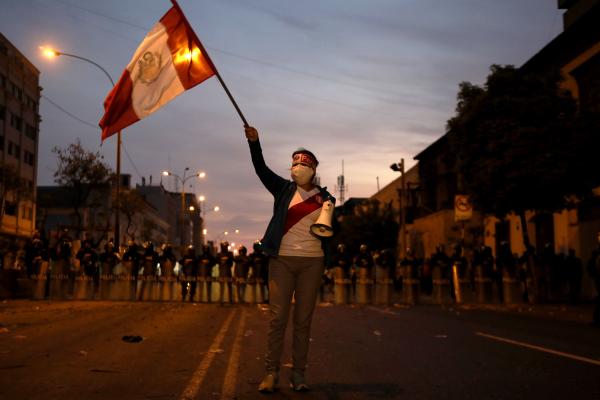
Join Hudson Adjunct Fellow Daniel Batlle and a panel of leading analysts as they examine what lies ahead for Peru and whether the country can convert its economic potential into lasting security and sovereignty ahead of its 2026 elections.
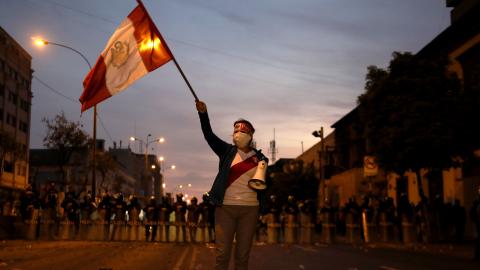
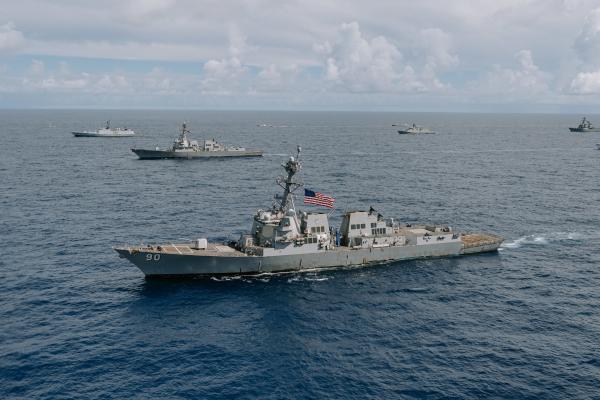
Join Hudson Senior Fellows Bryan Clark and Michael Roberts for a discussion with government and industry leaders about the challenges the US Navy and Coast Guard face amid modernization efforts and how new legislation and regulation can help restore America’s maritime superiority.

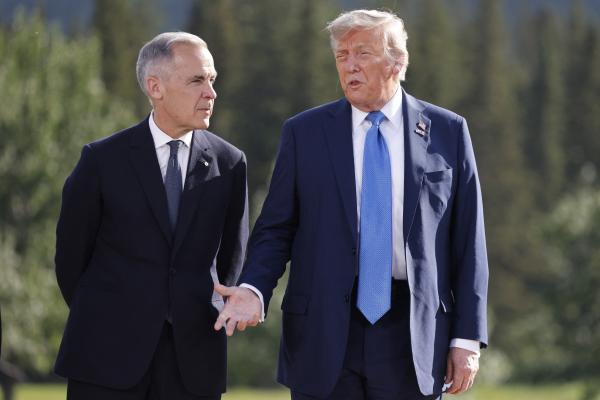
Join Hudson Senior Fellow Matt Boyse for a discussion with former Canadian Minister for Trade and Economic Development Ed Fast, and CNAPS Executive Director Jamie Tronnes, as they explore a new path forward for US-Canada relations and what other allies can learn from the process.
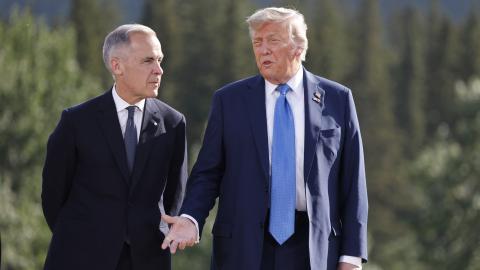
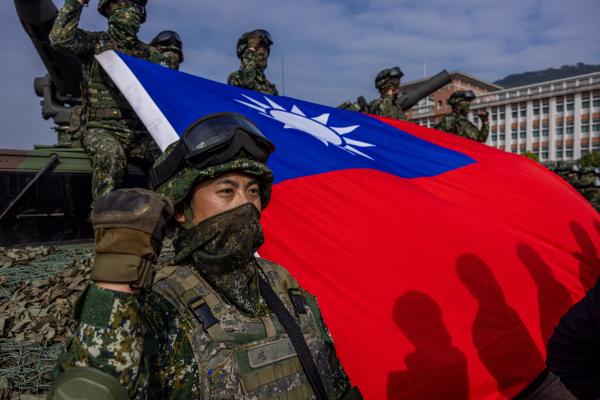
General David H. Petraeus (US Army, ret.) will join Hudson’s Jason Hsu for a conversation about what the war in Ukraine has revealed about the future of warfare—and what these lessons mean for Taiwanese security.

